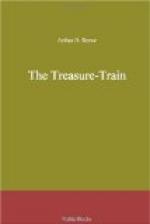At last, in a large, cleared field, we came upon a most peculiar heap of debris. As nearly as I could make out, it was a pile of junk, but most interesting junk. Practically all of it consisted in broken bits of the celluloid-like stuff we had seen in the abandoned building. Twisted inextricably about were steel wires and bits of all sorts of material. In the midst of the wreckage was something that looked for all the world like the remains of a gas-motor. It was not rusted, either, which indicated that it had been put there recently.
As he looked at it, Craig’s face displayed a smile of satisfaction.
“Looks as though it might have been an aeroplane of the tractor type,” he vouchsafed, finally.
“Surely there couldn’t have been an accident,” objected MacLeod. “No aviator could have lived through it, and there’s no body.”
“No; it was purposely destroyed,” continued Craig. “It was landed here from somewhere else for that purpose. That was what the man in the picture was doing with the ax. After the last explosion something happened. He brought the machine here to destroy the evidence.”
“But,” persisted MacLeod, “if there had been an aeroplane hovering about we should have seen it in the air, passing over the works at the time of the explosion.”
Kennedy picked the pieces, significantly.
“Some one about here has kept abreast of the times, if not ahead. See; the planes were of this non-inflammable celluloid that made it virtually transparent and visible only at a few hundred feet in the air. The aviator could fly low and so drop those pastilles accurately—and unseen. The engine had one of those new muffler-boxes. He would have been unheard, too, except for that delicate air-ship detector.”
MacLeod and I could but stare at each other, aghast. Without a doubt it was in the old merry-go-round building that the phantom aviator had established his hangar. What the connection was between the tragedy in the Snedden family and the tragedy in the powder-works we did not know, but, at least, now we knew that there was some connection.
It was growing dark rapidly, and, with some difficulty, we retraced our steps to the point where we had left the car. We whirled back to the town, and, of course, to the Snedden house.
Snedden was sitting in the parlor when we arrived, by the body of his wife, staring, speechless, straight before him, while several neighbors were gathered about, trying to console him. We had scarcely entered when a messenger-boy came up the path from the gate. Both Kennedy and MacLeod turned toward him, expecting some reply to the numerous messages of alarm sent out earlier in the afternoon.
“Telegram for Mrs. Snedden,” announced the boy.
“Mrs. Snedden?” queried Kennedy, surprised, then quickly: “Oh yes, that’s all right. I’ll take care of it.”




